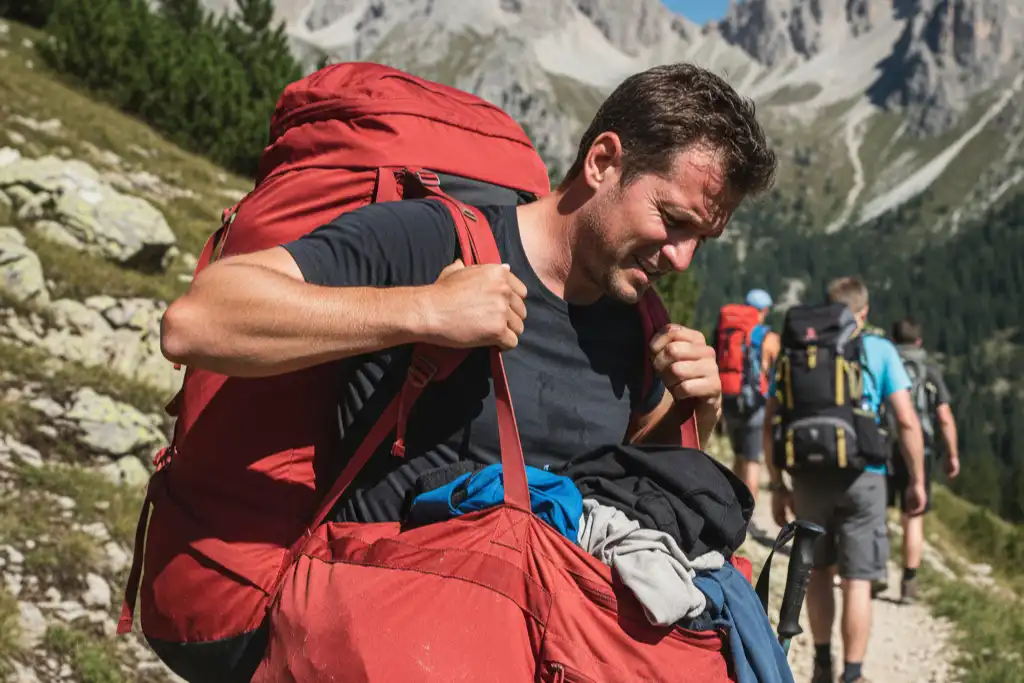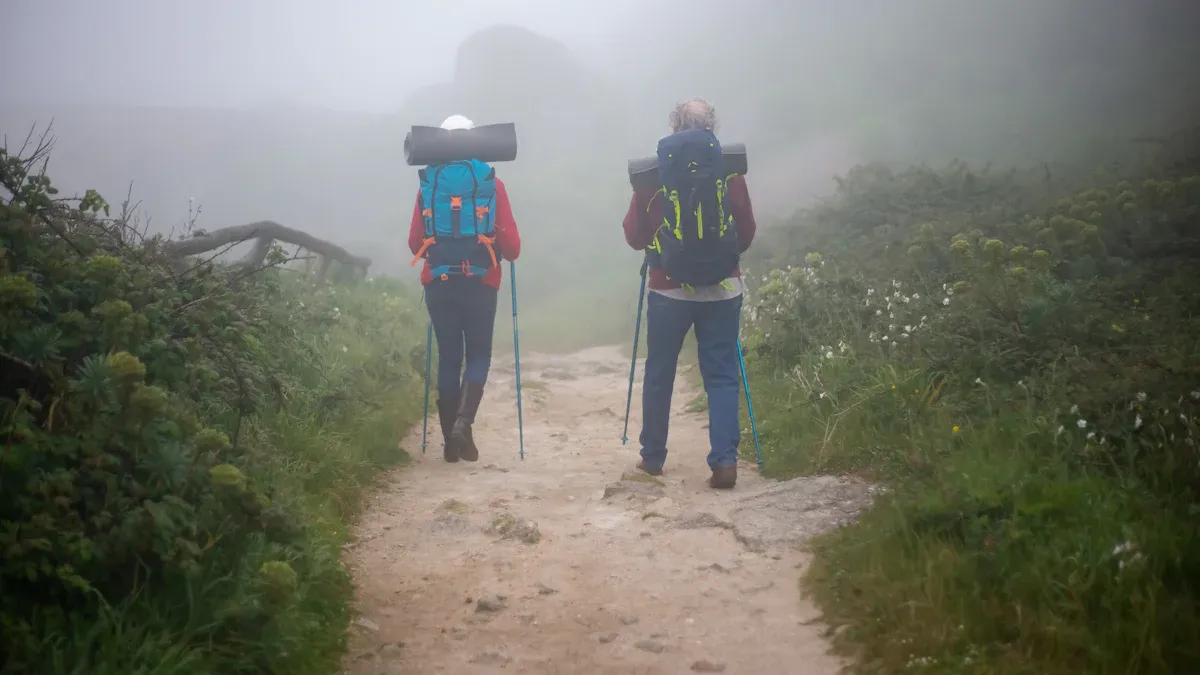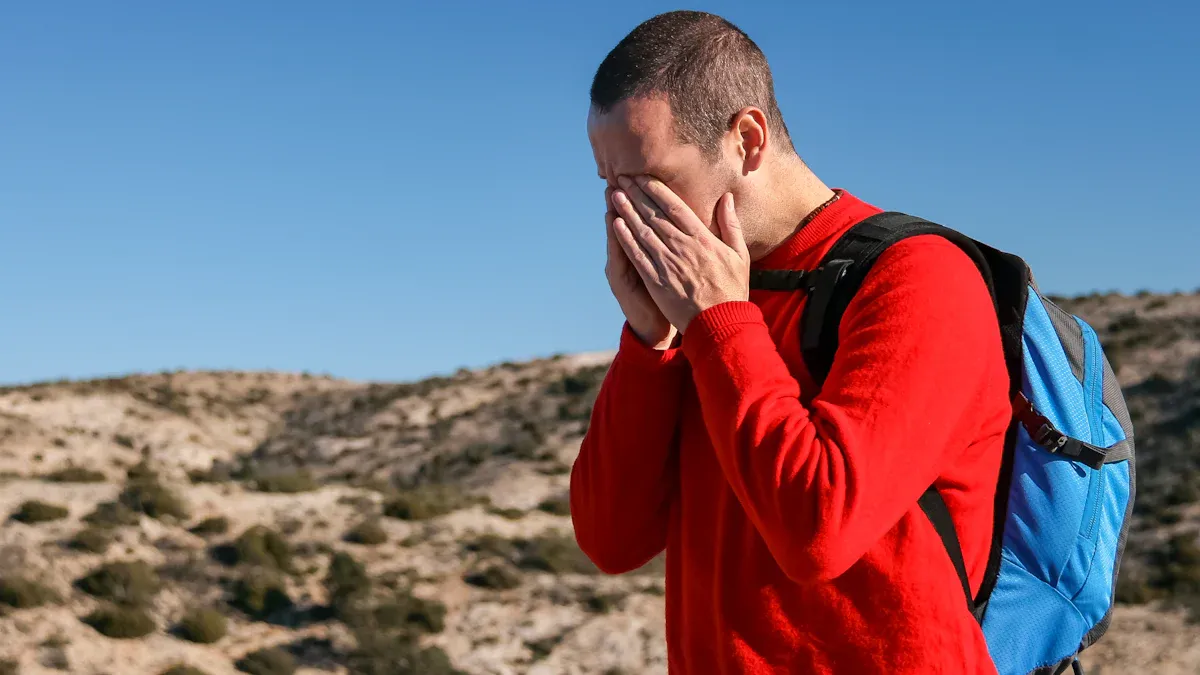The Impact of Inappropriate Backpacks on Hiking Performance and Health

Choosing an inappropriate backpack for hiking can hurt you right away. A bad backpack can make you feel uncomfortable and slow you down. You may feel pain in your back or shoulders. You might also get tired much faster than normal. The table below shows how the wrong load can change your muscles and joints. This can cause pain and even long-term problems.
| Evidence Type | Findings |
|---|---|
| Biomechanical Changes | Carrying an inappropriate backpack changes how your muscles work and how your joints move. This can cause pain and even injury. |
| Health Outcomes | There is a higher chance of back pain and discomfort. This happens because the load puts stress on your spine and tissues. |
| Long-term Effects | Carrying heavy backpacks often can cause long-term back pain. It can also make your spine less stable. |
If you have ever felt sore or wobbly while hiking, your inappropriate backpack could be the cause.
Key Takeaways
- Choosing the right backpack is crucial for comfort and performance. A well-fitted pack helps you move easily and reduces fatigue.
- Keep your backpack weight under 10% of your body weight. This helps prevent back pain and keeps your energy levels up during hikes.
- Distribute weight evenly in your backpack. Place heavy items close to your back to maintain balance and reduce the risk of injury.
- Look for backpacks with padded straps and a strong hip belt. These features help support your body and prevent discomfort.
- Always adjust your backpack before hiking. A proper fit can prevent long-term health issues and make your hiking experience more enjoyable.
Inappropriate Backpack Effects on Performance

Reduced Mobility and Endurance
If your backpack is not right for hiking, your body works harder. A pack that is too heavy or does not fit well can change how you walk. You might lean forward more, take shorter steps, and twist your hips extra. These changes make it tough to move easily and keep your energy up.
A good backpack helps you stand straight and move well. If your pack does not fit, you may feel stiff or sore after a short hike.
Research shows backpack design affects how you move and how long you can hike:
| Evidence Type | Findings |
|---|---|
| Biomechanical Effects | Good backpack design helps you stand straight and move better. |
| Physiological Effects | How the pack fits and spreads weight matters for comfort and endurance. |
| Recommendations | Backpacks with special features are best for hiking to help you move easily. |
If your backpack is over 10% of your body weight, your muscles and joints work harder. This can make it hard to hike far or keep going without stopping.
Increased Fatigue and Slower Pace
A bad backpack does not just slow you down. It makes you tired faster. If your pack is too heavy or the weight is not spread out, your muscles work extra hard. This makes you tired early and slows your hiking speed.
- Carrying a heavy or wrong backpack can slow you down and make you hike less far.
- A heavy pack uses more energy, so it is hard to keep a steady pace.
- Picking gear wisely and carrying less weight can help you hike better.
You may feel more pain in your shoulders, neck, and back as your pack gets heavier. The table below shows how different backpack weights change your comfort and effort:
| Load Condition | Mean RPE Rating | Reported Discomfort |
|---|---|---|
| 0% BW | N/A | N/A |
| 20% BW | Fairly Light | Shoulders can hurt a lot |
| 40% BW | Hard | Shoulders, neck, and upper back hurt more |
If you want to hike longer and feel good, keep your backpack under 10% of your body weight.
Balance and Stability Issues
Balance is important when you hike on rough trails. A bad backpack can mess up your balance and make you feel shaky. Packs that do not fit or have poor weight spread can pull you backward or sideways. This makes it easier to trip or fall.
- Hip belts that fit well can move up to 70% of the weight from your shoulders to your hips, which helps you stay steady.
- New backpacks for tough trails have features that keep the weight steady when you move side to side.
- Even weight helps you keep your balance and lowers your chance of falling.
- Carrying an extra 15% of your body weight makes it harder to catch your balance if you slip.
- You might need to change your steps to avoid falling, which can make hiking feel weird.
- Backpack design and where you put the weight are very important for staying safe and steady.
If you feel shaky or unstable a lot, your backpack could be the reason. Picking the right pack can help you move better and enjoy your hike more.
Inappropriate Backpack Health Risks

Back, Shoulder, and Neck Pain
You may notice pain in your back, shoulders, or neck after using an inappropriate backpack. This pain often comes from carrying too much weight or using a pack that does not fit your body. When you use a backpack that is too heavy, your muscles and spine must work harder to keep you upright. Over time, this extra effort can cause soreness and even long-term problems.
- Children are especially at risk. Their spines are still growing, so heavy backpacks can cause more harm.
- Many children carry backpacks that weigh more than 10% of their body weight. Some even carry up to 22% or more.
- Almost half of children report back pain at some point in their lives.
- Heavy backpacks can make you lean forward or arch your back, which changes your natural posture.
- Pain can show up in different places, like the neck, shoulders, or lower back.
Carrying a heavy or poorly fitted backpack can change your posture and lead to pain that lasts for years. You may even notice numbness or tingling if nerves get pressed.
If you feel pain in your back or neck after hiking, your backpack may be the cause. Choosing a pack that fits well and does not weigh too much can help protect your spine and muscles.
Muscle Strain and Fatigue
Your muscles work hard when you hike with a heavy or inappropriate backpack. The muscles in your back, shoulders, and neck must support the extra weight. This can lead to muscle fatigue, soreness, and even weakness.
“A recent study found that backpacks over 12% of your body weight reduce the activity of important back muscles. This weakens your spine’s support and puts more stress on other muscles.”
When you carry a heavy load, your muscles get tired faster. You may notice that your back feels tight or that you cannot move as easily. Over time, this can make your muscles less flexible and more likely to get injured.
Carrying a heavy backpack during long hikes increases the work your muscles must do. This is especially true when you walk uphill. The more weight you carry, the more likely you are to feel tired and sore before you finish your hike.
Injury Risks: Sprains, Blisters, and Joint Stress
An inappropriate backpack does not just cause pain. It can also lead to injuries that keep you off the trail. Heavy or poorly fitted packs can make you lose your balance, trip, or fall.
| Evidence Type | Description |
|---|---|
| Balance Issues | Carrying a backpack that is 30% of your body weight makes it hard to balance after just 22 minutes. |
| Physical Strain | Heavy backpacks press down on your spine, which can lead to back pain and even nerve damage. |
| Exhaustion | Carrying too much weight makes hiking exhausting and increases your risk of injury. |
You may also face other problems:
- Overloaded backpacks can cause sprains and stress your joints.
- Poorly fitted packs can lead to pain in your arms, back, neck, and shoulders.
- Using both shoulder straps and choosing padded, wide straps can help lower these risks.
- Heavy backpacks can change the curve of your spine and put more pressure on your bones.
- Running or jumping with a heavy pack can make these problems worse.
- Long hikes with a heavy load can cause blisters, especially if the pack rubs against your skin.
- Children who use heavy backpacks may develop poor posture and even nerve problems.
If you often feel discomfort, numbness, or tingling after hiking, your backpack may be the reason. Over time, these issues can affect your health, your ability to move, and even your performance in school or sports.
Choosing the right backpack and keeping the weight low can help you avoid these health risks. Always check how your pack fits and make sure it does not feel too heavy before you hit the trail.
Common Backpack Mistakes
Poor Fit and Sizing
You might think any backpack will do, but size and fit matter a lot. If your backpack does not match your body, you can feel pain in your shoulders or neck. A poor fit puts too much pressure on your shoulders, which can cut off blood flow and cause soreness. Heavy packs that pull your shoulders back may even lead to neck tension or spinal problems. Many hikers forget to adjust their packs to fit their bodies. This mistake can make every step harder and less comfortable.
Tip: Always try on your backpack before a hike. Adjust the straps so the pack sits close to your back and the weight rests on your hips.
Bad Weight Distribution
Packing your gear the wrong way can make your hike much harder. When you put too much weight on one side or let heavy items hang low, your muscles work unevenly. This can cause muscle fatigue and raise your risk of injury, especially in your back, neck, and shoulders. Older hikers face even more risk because muscle loss and joint pain can get worse with bad weight distribution. Poor balance from a lopsided pack can lead to falls or slow recovery after a stumble.
- Place heavy items close to your back and in the middle of the pack.
- Use side pockets for lighter gear.
- Check your pack’s balance before you start hiking.
Missing Support Features
Some backpacks lack important support features. Without padded shoulder straps, hip belts, or chest straps, you may feel more pain and get tired faster. These features help spread the weight and keep the pack steady as you move. Many hikers skip these details and end up with discomfort or even injuries.
Common mistakes hikers make include:
- Carrying too much weight at the start of the trail.
- Overestimating what gear you need and packing unnecessary items.
- Not checking if the backpack fits well.
- Forgetting to adjust the pack to your body.
- Not tracking gear weight, which adds up quickly.
Note: Making a simple gear list or spreadsheet can help you spot extra items and keep your pack light.
Choosing the Right Backpack
Key Features to Look For
When you pick a hiking backpack, you want comfort, support, and durability. Experts recommend looking for these features:
| Feature | Description |
|---|---|
| Suspension Systems | Padded shoulder straps, a strong hip belt, and a sternum strap. The hip belt should carry most of the weight. |
| Capacity and Organization | Choose a size that matches your hike. Day packs hold 20-35 liters. Multi-day packs hold 40-70 liters. |
| Material Quality | Nylon or polyester fabrics last longer and resist weather. Higher denier numbers mean tougher material. |
| Fit and Comfort | The pack should feel like part of your body. Most weight should rest on your hips, not your shoulders. |
| Specialized Features | Some hikes need special packs, like minimalist bags for running or urban packs for city walks. |
A good backpack helps you move better and keeps you safe on the trail.
Fitting and Adjustment Tips
You can avoid pain and injury by fitting your backpack the right way. Follow these steps:
- Fasten the waist strap snugly around your hips. This supports most of the weight.
- Adjust the shoulder straps so they are close but not too tight.
- Pull the load lifters at a 45-degree angle. Do not over-tighten.
- Clip the chest strap. Make sure you can breathe and move your arms easily.
- Make small adjustments during your hike if you feel discomfort.
Tip: Wearing a backpack with a hip belt can reduce shoulder and neck pain. Supportive hiking boots also help prevent injuries like rolled ankles and blisters.
Backpack Tips for Different Hikes
Choose your backpack based on the type of hike. Here is a quick guide:
| Hiking Type | Recommended Capacity (Liters) |
|---|---|
| Short day hikes | 10-20 |
| Summit packs | 18-24 |
| Average day hikes and everyday use | 20-30 |
| Long day hikes or ultralight overnights | 30-40 |
For trips longer than three days, you may want a larger pack like the Osprey Aura 65L. Always match your backpack to your hike to stay comfortable and safe.
An inappropriate backpack can change how you walk, cause pain, and raise your risk of injury. You can see the main impacts in the table below:
| Statistic/Study | Finding |
|---|---|
| Gait Changes | Stride length drops with heavier loads |
| Pain Reports | Many hikers report severe pain with heavy packs |
| Back Pain Prevalence | Over 25% report back pain lasting more than 15 days a year |
Choosing the right backpack helps you hike longer and feel better. Look for hip belts, padded harnesses, and balanced weight. You should check your pack before every hike. A good backpack supports your health and makes hiking more fun.
- Pick a comfortable, well-fitted pack to prevent injuries.
- Use a durable pack to avoid gear failure.
- Distribute weight evenly to keep good posture.
Start your next hike with the right gear and enjoy the benefits for your body and mind.
FAQ
How heavy should your hiking backpack be?
You should keep your backpack under 10% of your body weight. This helps you avoid pain and fatigue. For example, if you weigh 120 pounds, your pack should not be more than 12 pounds.
What features make a backpack good for hiking?
Look for padded shoulder straps, a strong hip belt, and a chest strap. These features help spread the weight. Choose a pack that fits your body and feels comfortable.
Can a bad backpack cause long-term health problems?
Yes. Carrying a heavy or poorly fitted backpack can lead to back pain, poor posture, and even nerve issues. You may notice these problems after many hikes.
How do you know if your backpack fits correctly?
Your backpack fits well if most weight rests on your hips, not your shoulders. The pack should sit close to your back. You should move your arms and walk easily.
See also
How Many Customized Waterproof Bags Do You Need to Order at Minimum
Custom Hiking Backpack Questions You Should Ask Before Buying
Lightweight vs Heavy-Duty Waterproof Bags Which Is Best for You
How to Use a Waterproof Bag for Emergency Purposes in The Wild



Comments are closed